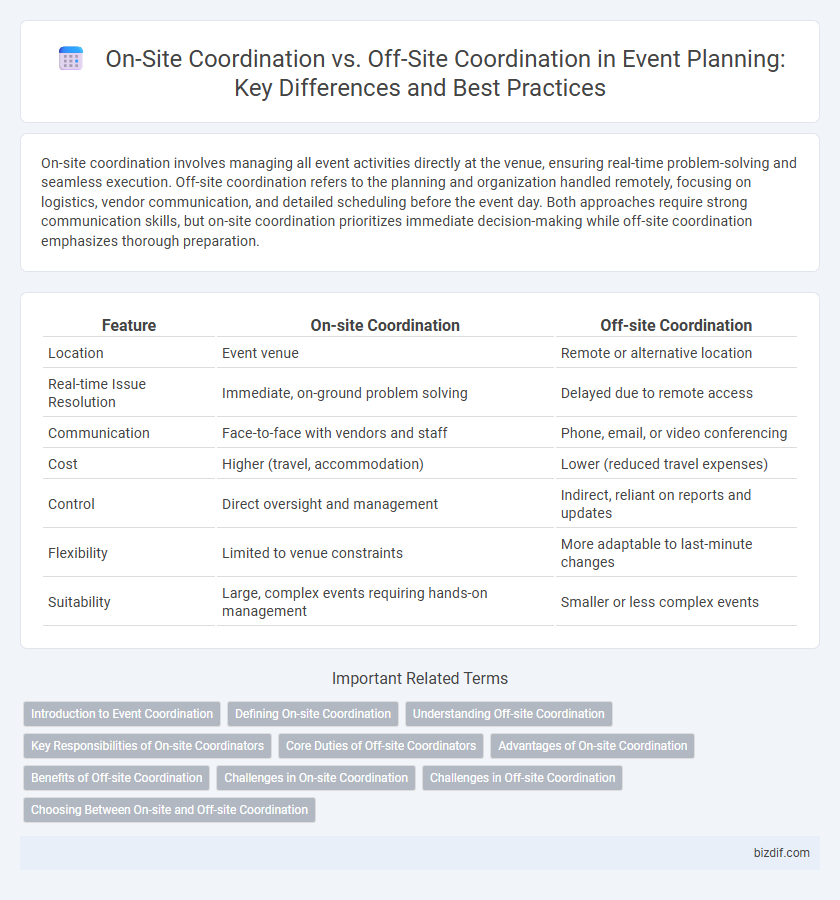On-site coordination involves managing all event activities directly at the venue, ensuring real-time problem-solving and seamless execution. Off-site coordination refers to the planning and organization handled remotely, focusing on logistics, vendor communication, and detailed scheduling before the event day. Both approaches require strong communication skills, but on-site coordination prioritizes immediate decision-making while off-site coordination emphasizes thorough preparation.
Table of Comparison
| Feature | On-site Coordination | Off-site Coordination |
|---|---|---|
| Location | Event venue | Remote or alternative location |
| Real-time Issue Resolution | Immediate, on-ground problem solving | Delayed due to remote access |
| Communication | Face-to-face with vendors and staff | Phone, email, or video conferencing |
| Cost | Higher (travel, accommodation) | Lower (reduced travel expenses) |
| Control | Direct oversight and management | Indirect, reliant on reports and updates |
| Flexibility | Limited to venue constraints | More adaptable to last-minute changes |
| Suitability | Large, complex events requiring hands-on management | Smaller or less complex events |
Introduction to Event Coordination
On-site coordination involves managing all event activities directly at the venue, ensuring smooth operations such as setup, vendor communication, and real-time problem solving. Off-site coordination focuses on pre-event planning tasks like logistics, scheduling, and vendor negotiations, which are handled remotely prior to the event day. Understanding the distinctions between these coordination types is essential for seamless event execution and optimizing resource allocation.
Defining On-site Coordination
On-site coordination involves managing all event activities directly at the venue, ensuring seamless execution of logistics, vendor interactions, and guest services. It requires real-time problem-solving, supervising setup, overseeing schedules, and handling emergencies to maintain the event flow. This hands-on approach maximizes control over event details, boosting guest satisfaction and overall success.
Understanding Off-site Coordination
Off-site coordination in event planning involves managing logistics and vendor relationships remotely, ensuring seamless communication and troubleshooting without being physically present at the venue. This approach leverages technology such as video calls, project management tools, and real-time updates to maintain control over event execution from a different location. Effective off-site coordination requires meticulous planning, clear documentation, and proactive problem-solving to synchronize all elements of the event successfully.
Key Responsibilities of On-site Coordinators
On-site coordinators manage real-time event logistics, ensuring seamless execution from setup to breakdown by liaising with vendors, staff, and attendees. They handle immediate problem-solving, monitor event flow, and maintain adherence to the schedule and safety protocols. Their presence on location allows for quick decision-making and direct supervision, which is critical for mitigating risks and enhancing guest experience.
Core Duties of Off-site Coordinators
Off-site coordinators manage event logistics remotely by liaising with vendors, securing permits, and coordinating schedules to ensure seamless execution. They handle pre-event preparations such as contract negotiations, budget tracking, and communication with venues, allowing on-site teams to focus solely on real-time event management. Effective off-site coordination streamlines planning processes and minimizes operational risks on the event day.
Advantages of On-site Coordination
On-site coordination offers real-time problem solving and immediate decision-making, ensuring smooth event flow and quick adjustments to any unexpected issues. Direct communication with vendors, staff, and attendees enhances efficiency and minimizes misunderstandings during the event. Physical presence allows precise control over setup, logistics, and ambiance, significantly improving the overall guest experience.
Benefits of Off-site Coordination
Off-site coordination offers enhanced flexibility by allowing planners to manage logistics without being tied to a specific venue, enabling streamlined communication with multiple vendors and stakeholders. It reduces on-site pressure, permitting focus on strategic planning and troubleshooting before the event day, which helps prevent last-minute issues. Off-site coordination also facilitates comprehensive rehearsals and remote monitoring, ensuring smoother event execution and higher client satisfaction.
Challenges in On-site Coordination
On-site coordination in event planning presents challenges such as real-time problem solving, managing unexpected delays, and ensuring seamless communication among vendors and staff. Coordinators must address last-minute changes to logistics, troubleshoot technical issues, and maintain smooth attendee flow under high-pressure conditions. These complexities demand quick decision-making and adaptability to prevent disruptions and uphold event quality.
Challenges in Off-site Coordination
Off-site coordination in event planning presents challenges such as limited control over venue conditions, dependency on third-party vendors for timely setup, and communication barriers due to physical distance from the event location. Managing unforeseen issues like equipment malfunctions or last-minute changes becomes more complex without immediate on-site presence. Efficient use of remote monitoring tools and clear contingency plans are essential to mitigate these risks and ensure smooth event execution.
Choosing Between On-site and Off-site Coordination
Choosing between on-site and off-site coordination depends on the event's scale, complexity, and location logistics. On-site coordination ensures real-time problem-solving, direct vendor management, and immediate adjustments during events, ideal for large-scale or dynamic setups. Off-site coordination suits smaller, less complex events where pre-event planning and remote communication can efficiently manage event details without the need for constant physical presence.
On-site Coordination vs Off-site Coordination Infographic

 bizdif.com
bizdif.com